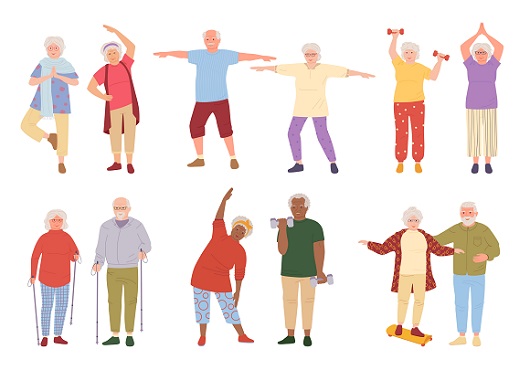In this edition
- Aging. Everyone is doing it, but we don’t all do it in the same manner.
- High Blood Pressure Education Month
- National American Stroke Month
- A healthy diet and more movement can help support a healthy body and mind.
About the Newsletter
Learn about was to improve communication with age related changes, ways to assess if someone is experiencing a stroke, tips to keep your blood pressure in a healthy range, and an easy strawberry quinoa salad recipe that makes for a coloul and tasty meal!
Aging. Everyone is doing it, but we don’t all do it in the same manner.
By Tami Brancamp, Ph.D.

Black older couple leaning on each other.
How do we know if we are aging “normally?” There are normal natural processes that we experience as we age. Some impact human communication – the act of exchanging information. Some of the common age-related changes impact hearing and vision. Here are a few of those age-related changes that can impact successful communication followed by some tips for improvement.
Hearing Changes – Hearing loss is the third most common chronic condition reported by older adults. Approximately 30% of people 65-75 years of age experience a hearing impairment. Those 75 years and older have a greater increase in hearing loss, between 40-50%. Normal age-related hearing loss results from our lifetime exposure to noise. With this hearing loss, we have a reduced ability to recognize certain types of speech sounds. These are high-frequency speech sounds such as the “s” in sing and the “th” in this. It also impacts our ability to hear non-speech sounds and environmental sounds, such as birds chirping and phones ringing.
Vision Changes – We also experience vision changes with aging. These changes impact our ability to read small print and see in low light environments. Almost all adults over the age of 55 need glasses at least part of the time due to age-related vision changes. This is where the lens of the eye loses its ability to focus.
We might need a larger font or better light. There can also be a reduced ability to see to the side while facing forward. This impacts our ability to see people in our environment and around us which can lead to less social engagement and communication.
Age-related changes to hearing and vision can have an impact on successful communication. But there are many ways we can modify our communication styles to be more successful.
Here are some tips for better communication:
- Communicate in an area with reduced background noise.
- Be focused on those speaking to you.
- Face the person you are speaking to.
- Ask others not to yell, but to speak in their usual tone.
- Light should be facing the person speaking to you and not behind them.
- Ask for others to rephrase or speak more clearly if needed.
- Shorter conversations are best in low-hearing environments.
- Communication is a two-way street. It’s OK to let others know if you are not understanding what is being said.
- And most importantly, be patient with yourself and with others.
For More information about the author
High Blood Pressure Education Month

Older adults participating in healthy activities.
High blood pressure increases your risk for heart disease and stroke. The good news is that there are steps you can take every day to keep your blood pressure in a healthy range.
Start today by Visiting
National American Stroke Month

National American Stroke Month graphic.
American Stroke Month was created to promote public awareness and reduce the incidence of stroke in the United States. To quickly assess whether a person might be experiencing a stroke, act FAST:
- F for Face: Is the person’s smile lopsided?
- A for Arms: If the person extends both arms to their side and raises them to shoulder level, does one arm droop?
- S for Speech: Does the person have difficulty speaking a simple sentence like “The sky is blue”?
- T for Time: If the answer to any of these questions is “yes,” it’s time to call 911 immediately.
For more on National American Stroke Month
A healthy diet and more movement can help support a healthy body and mind.
Below is a heart-healthy, low sodium recipe to nourish your body. Strawberry Quinoa Salad

Strawberries
May is National Strawberry and National Salad month. This recipe is a simple and nutritious way to add more fruit to your plate. It is also a great way to add color, flavor and texture plus vitamins, minerals and dietary fiber. Strawberries will be in season this month so enjoy some while they are in abundance and reasonably priced. *Quinoa is an edible seed, eaten like a whole grain, rich in antioxidants and high in protein and fiber.
Ingredients for Salad:
- ½ cup dry quinoa, rinsed well
- 2 cups baby spinach leaves
- ⅔ cup strawberries, sliced
- 2 tablespoons sliced almonds, roasted
- 1 handful fresh basil, chopped finely
Ingredients for Dressing:
- 2 tablespoons balsamic vinegar
- 1 teaspoon olive oil
- 1 teaspoon Dijon mustard
- salt and fresh ground pepper to taste
For more information on Strawberry Quinoa Salad
Published by:
Brancamp, T., 2022, Healthy LIVING while aging! (2022-05), Extension, University of Nevada, Reno, Newsletter
An EEO/AA Institution. Copyright ©
2026, University of Nevada Cooperative Extension.
A partnership of Nevada counties; University of Nevada, Reno; and the U.S. Department of Agriculture


